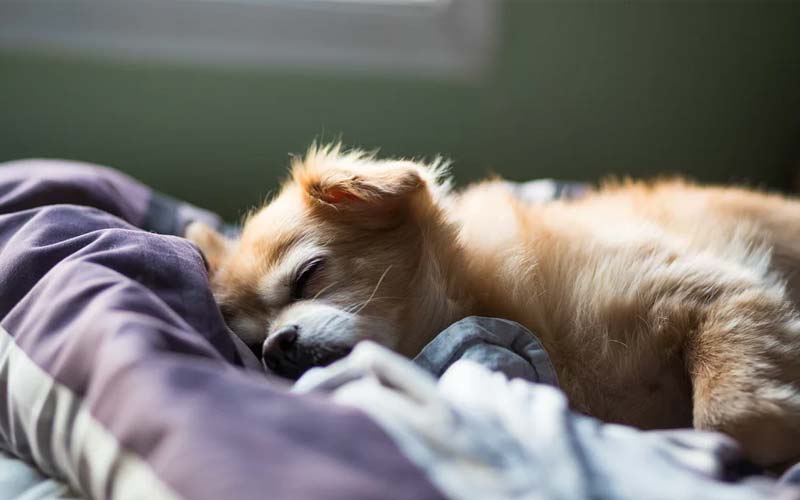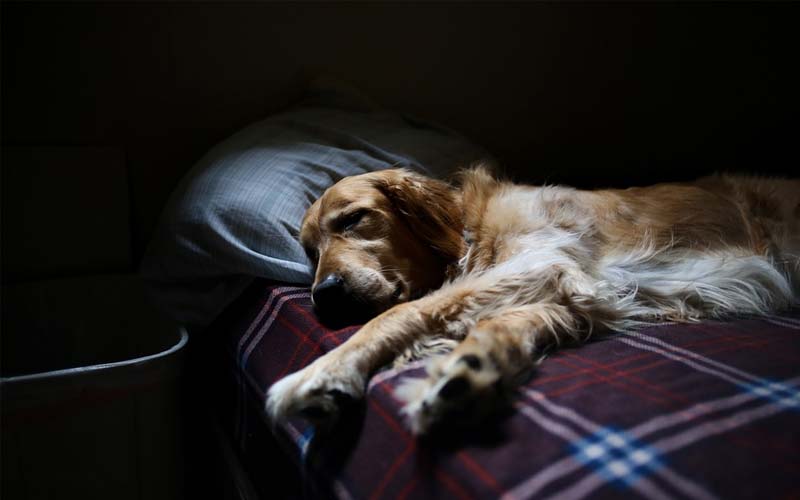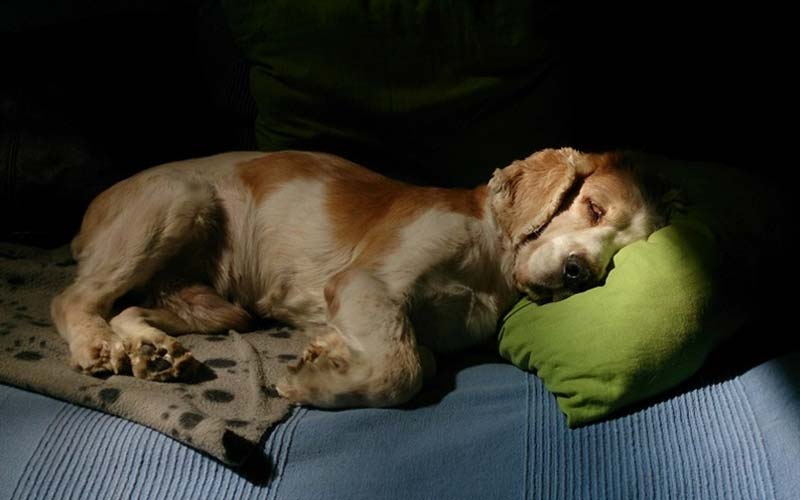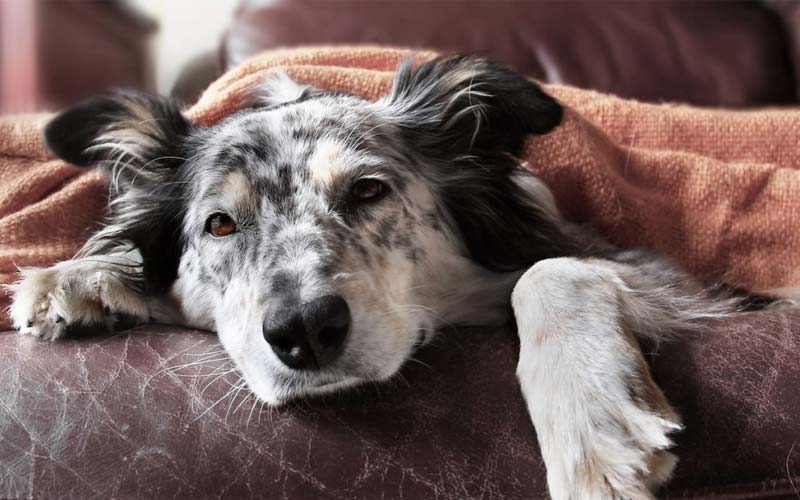If you have a dog, you may have noticed that they pant sometimes. Panting is a normal way for dogs to cool down and regulate their body temperature. However, if your dog is panting excessively at night, it could be a sign of something more serious.

Dog panting at night can affect your dog’s sleep quality and well-being, as well as your own. It can also indicate underlying health issues, environmental stressors, or anxiety triggers. Therefore, it is important to understand why your dog is panting at night and how to help them.
In this article, we will explore the common causes of dog panting at night and provide simple solutions for a peaceful sleep. Discover the reasons behind your dog’s nighttime panting and find solutions for a peaceful sleep!
Common Causes of Dog Panting at Night
There are many possible reasons why your dog may pant at night. Some of the most common ones are:
1. Medical Conditions
Some medical conditions can cause your dog to pant excessively at night, such as:
- Respiratory issues: If your dog has difficulty breathing, they may pant more to get enough oxygen. This can be caused by allergies, asthma, bronchitis, pneumonia, or heart disease.
- Pain: If your dog is in pain, they may pant more to cope with the discomfort. This can be caused by injuries, arthritis, dental problems, or cancer.
- Overheating: If your dog is too hot, they may pant more to cool down. This can be caused by fever, infection, or heat stroke.
- Hormonal imbalances: If your dog has an imbalance in their thyroid or adrenal glands, they may pant more due to increased metabolism or stress. This can be caused by hyperthyroidism, Cushing’s disease, or diabetes.
2. Environmental Factors
Some environmental factors can also cause your dog to pant excessively at night, such as:
- Hot weather: If your dog is exposed to high temperatures, they may pant more to cool down. This can be especially problematic in summer or in tropical regions.
- Dry air: If your dog is exposed to low humidity, they may pant more to moisten their airways. This can be especially problematic in winter or in dry regions.
- Lack of water: If your dog is dehydrated, they may pant more to compensate for the loss of fluids. This can be caused by insufficient water intake, vomiting, diarrhea, or kidney disease.
- Uncomfortable bedding: If your dog is sleeping on a hard, rough, or dirty surface, they may pant more to relieve the discomfort. This can be caused by poor quality or inappropriate bedding.

3. Anxiety or Stress
Some psychological factors can also cause your dog to pant excessively at night, such as:
- Fear of noises: If your dog is afraid of loud or unfamiliar noises, they may pant more to cope with the fear. This can be triggered by thunderstorms, fireworks, sirens, or other sources of noise.
- Separation anxiety: If your dog is anxious about being left alone, they may pant more to express their distress. This can be triggered by changes in your routine, moving to a new place, or losing a family member or another pet.
- Unfamiliar surroundings: If your dog is not used to their sleeping environment, they may pant more to adapt to the new situation. This can be triggered by traveling, staying at a hotel, or visiting a friend’s house.
Simple Solutions for Dog Panting at Night
For each cause of dog panting at night, there are some actionable solutions and tips that you can try to help your dog. Here are some examples:

1. Medical Solutions
If you suspect that your dog is panting at night due to a medical condition, you should consult your veterinarian for diagnosis and treatment. Depending on the cause, your vet may prescribe medication, surgery, or other interventions to address the problem. Some of the possible treatments are:
- Respiratory issues: Your vet may prescribe antibiotics, steroids, bronchodilators, or oxygen therapy to improve your dog’s breathing. You may also need to monitor your dog’s heart rate, blood pressure, and oxygen levels at home.
- Pain: Your vet may prescribe painkillers, anti-inflammatories, or other drugs to relieve your dog’s pain. You may also need to provide your dog with a soft, warm, and comfortable bed to rest on.
- Overheating: Your vet may prescribe fluids, electrolytes, or cooling pads to lower your dog’s body temperature. You may also need to avoid exposing your dog to excessive heat or direct sunlight.
- Hormonal imbalances: Your vet may prescribe hormone replacement therapy, insulin, or other drugs to balance your dog’s hormones. You may also need to adjust your dog’s diet and exercise routine to suit their needs.
2. Environmental Solutions
If you think that your dog is panting at night due to an environmental factor, you should try to modify your dog’s sleeping environment to make it more comfortable and conducive to sleep. Some of the possible modifications are:
- Hot weather: You should provide your dog with plenty of fresh water and shade during the day, and avoid strenuous exercise or outdoor activities in the heat. You should also use fans, air conditioners, or ice packs to cool down your dog’s sleeping area at night.
- Dry air: You should provide your dog with a humidifier, vaporizer, or bowl of water near their bed to increase the moisture in the air. You should also avoid using heaters, fireplaces, or other sources of dry heat in your dog’s sleeping area.
- Lack of water: You should ensure that your dog has access to clean and fresh water at all times, and check their water bowl regularly. You should also avoid feeding your dog salty, spicy, or dry foods that can increase their thirst.
- Uncomfortable bedding: You should provide your dog with a soft, cozy, and clean bed that suits their size, shape, and preferences. You should also wash and change their bedding regularly, and remove any objects that can cause irritation or injury.
3. Anxiety Solutions
If you believe that your dog is panting at night due to anxiety or stress, you should try to identify and address the source of their anxiety and provide them with emotional support and comfort. Some of the possible solutions are:
- Fear of noises: You should provide your dog with a safe and quiet place to sleep, away from any sources of noise. You should also use white noise, music, or calming sounds to mask or drown out the noise. You may also consider using ear plugs, muffs, or hoods to protect your dog’s ears.
- Separation anxiety: You should create a consistent and positive routine for your dog, and avoid making a fuss when you leave or return. You should also provide your dog with toys, treats, or puzzles to keep them busy and distracted when you are away. You may also consider using a crate, a baby monitor, or a pet camera to make your dog feel more secure and connected.
- Unfamiliar surroundings: You should introduce your dog to their new sleeping environment gradually and positively, and avoid changing it too often. You should also bring along some familiar items, such as their bed, blanket, or toy, to make them feel more at home. You may also consider using pheromones, aromatherapy, or herbal remedies to calm your dog.

Conclusion
Dog panting at night is not always a cause for concern, but it can indicate a serious problem that needs attention. By understanding the common causes of dog panting at night and applying the simple solutions we have discussed, you can help your dog sleep better and improve their health and happiness.
If you have any questions or concerns about your dog’s panting, you should always consult your veterinarian for professional advice and guidance. For more information and tips on dog care, you can check out our other articles on our website.
